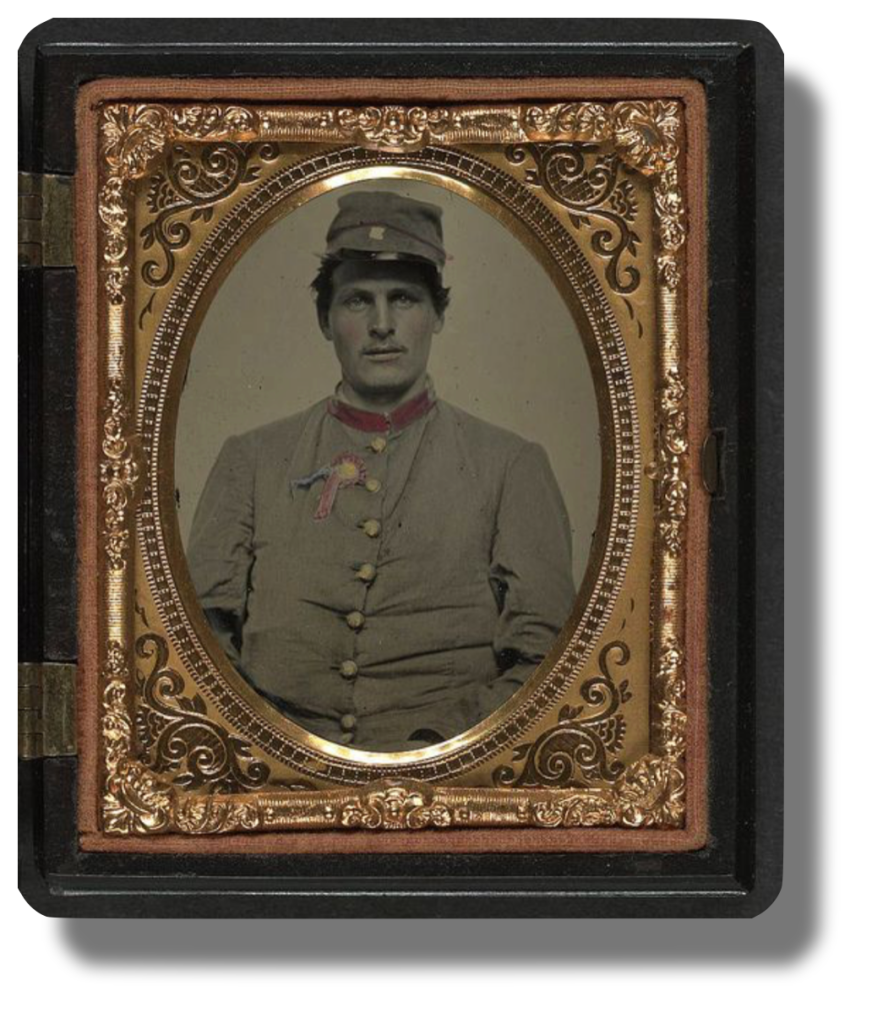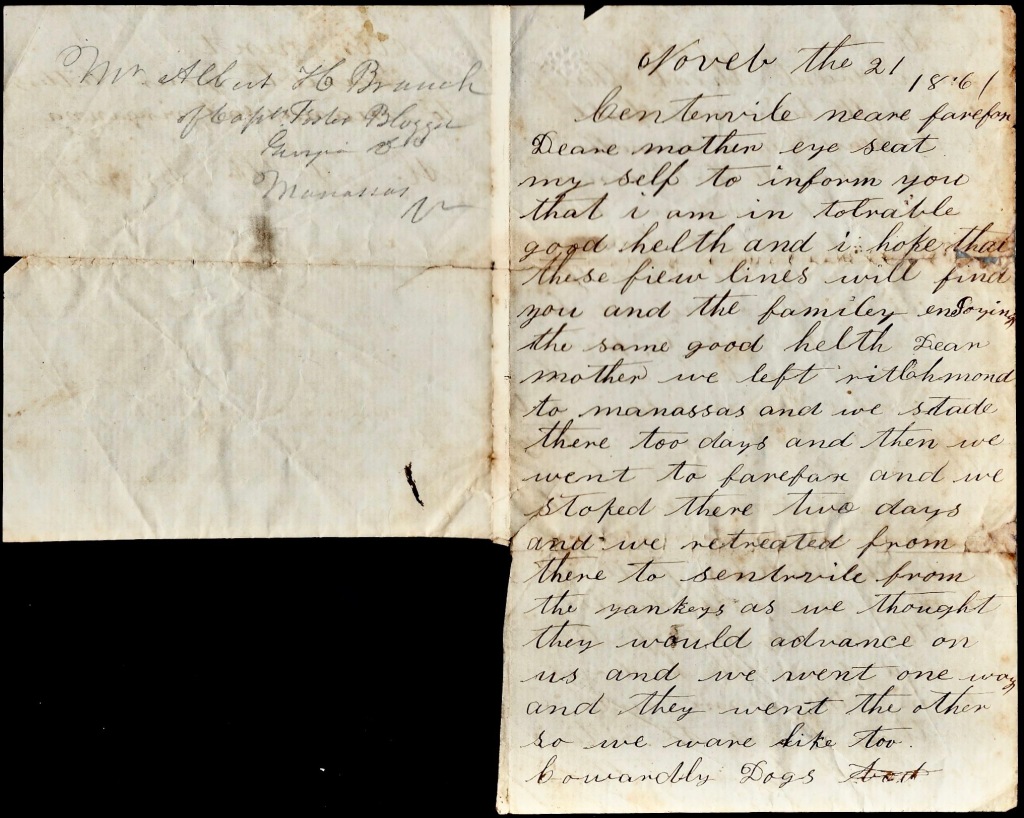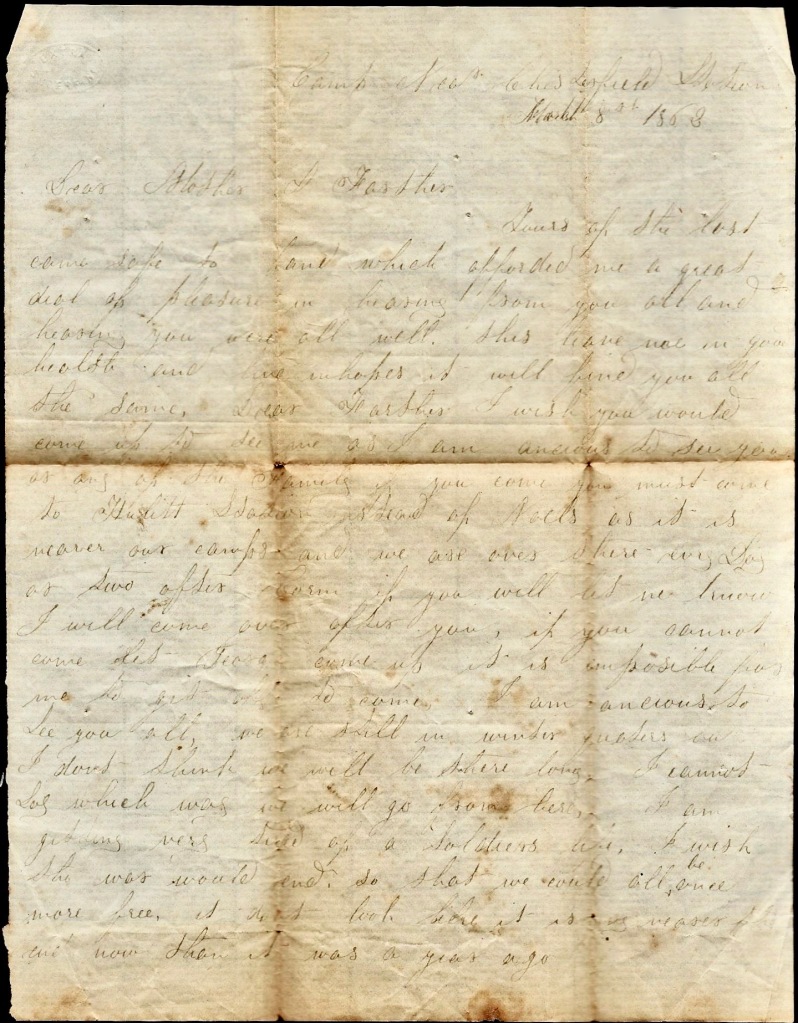
These letters were written by Albert (“Al”) Henry Branch (1834-Bef1896) of Co. I, 3rd Georgia Infantry. This company was detached from the regiment and became Blodgett’s Battery Georgia Light Artillery (or Co. C, 2d Battalion Georgia Light Artillery) on 5 August 1861. Following Blodgett’s resignation in May 1862, John Milledge, Jr. was elected captain and it became known as Milledge’s Battery Georgia Light Artillery. The company was sent to Virginia and assigned to C. Richardson’s and W. Nelson’s Battalion of Artillery. It served in the Richmond area until September, 1862. During the Maryland Campaign, this battery was one in the artillery battalions of Brown and Nelson who were guarding the Potomac fords near Williamsport and Shepherdstown on the Campaign. They were on the Virginia side of the river about a mile below Shepherdstown, and were not engaged in the fight at Sharpsburg.
At Fredericksburg and Chancellorsville, the battery was part of Pendleton’s Reserve Artillery. At Gettysburg, the battery arrived on the field too late to participated in the first days fight. On day 2, they took a position on Seminary Ridge a quarter mile north of the Chambersburg Pike, later moved to the rear of the Pennsylvania College, and at night returned to Seminary Ridge. On day 3 they fired from 20 to 25 rounds from the extreme left of the Confederate line in the afternoon.
At Cold Harbor, the battery was attached to Jubal Early’s Second Corps. Later the battery fought with Early in the Shenandoah Valley and around Appomattox.
Henry enlisted as a private on 3 June 1861 at Augusta, Georgia. He was wounded in the Wilderness on May 5, 1864, hospitalized, but returned to duty in July or August. He was then taken prisoner in the Battle of Waynesboro, Virginia, on 2 March 1865—the last battle for Jubal Early’s troops who were totally destroyed by Phil Sheridan’s army. Henry was sent to the prison at Fort Delaware where he remained until his release on 16 June 1865.
In 1869, Henry was married to Tallulah Beal in Burke county, Georgia. He was enumerated as a carpenter in Waynesboro, Georgia in the 1880 US Census. At the time, Henry and Tallulah had four children ranging from 10 months old to 9 years. By 1896, Henry had died; his widow was residing in Savannah, Georgia.
Letter 1
Centerville near Fairfax, Virginia
November 21, 1861
Dear Mother,
I seat myself to inform you that I am in tolerable good health and I hope that these few lines will find you and the family enjoying the same good health. Dear mother, we left Richmond to Manassas and we stayed there two days and then we went to Fairfax and we stopped there two days and we retreated from there to Centerville from the Yankees as we thought they would advance on us and we went one way and they went the other so we were like two cowardly dogs—both run at once—and I don’t think that we will have any fight atall.
Dear mother, answer this letter soon as you get it. We have moved into General [Robert] Toombs Brigade and we are well fortified here and we have got about seventy-five thousand men here on the Potomac. I have had the pleasure of visiting the battlefield of Manassas and seeing the dead Yankees. The gullies and the ditches [are] full of them—some half buried with one leg out of the ground, some the head out, some the arm out.
Nothing more to write. So goodbye until our next. Direct your letters to Manassas, Virginia.
— Al A. H. Branch
Letter 2
Camp near Chesterfield Station
February 24th 1863
Dear Father & Mother, brother & sister,
I again take my pen to write you a few lines hoping they will find you all as it now leaves me in good health. There is nothing of interest to write you as we are now snow bound and cannot move. I wrote you some time ago in answer to yours stating you would come up if you knew where we were. I am anxious for you to come as I cannot get off to come. I sent George five dollars in my last and Mr. [ ] sent you two to buy him some leather. If you cannot come, let me know if you received the letter or not. If you come, bring the leather with you. If you have not received it yet, Mr. [ ] [ ] enough to make a fine pair of shoes for we were and he will pay you for it.
Try and come as soon as you can as we will move as soon as the weather gets so we can some to [ ] but on the Central Road and enquire but you can very easy find us. Come if you [ ].
Your loving son, — A. H. Branch

Letter 3
Camp near Chesterfield Station
[Caroline county, Va.]
March 8, 1863
Dear Mother and Father,
Yours of the last came safe to hand which afforded me a great deal of pleasure in hearing from you all and hearing you were all well. This leaves me in good health and live in hopes it will find you all the same.
Dear Father, I wish you would come up to see me as I am anxious to see you as any of the family. If you come, you must come to Hewlett Station instead of Noel’s [on the Chesapeake & Ohio Railroad] as it is nearer our camps and we are over there every day or two after corn. If you will let me know, I will come over after you. If you cannot come, let George come up. It is impossible for me to get off to come [home]. I am anxious to see you all.
“I am getting very tired of a soldier’s life. I wish the war would end so that we could all be once more free. It don’t look here it is any nearer the end now than it was a year ago.”
We are still in winter quarters but I don’t think we will be there long. I cannot say which way we will go from here. I am getting very tired of a soldier’s life. I wish the war would end so that we could all be once more free. It don’t look here it is any nearer the end now than it was a year ago.
When you write to sister, give her my love and let me know if she is still in Richmond. Try and come up as soon as possible. Give sister and George my love. Write soon as you get this and let me know if you can come up. Give my respects to all of my enquiring friends.
Nothing more but remain your affectionate son, — A. H. Branch




